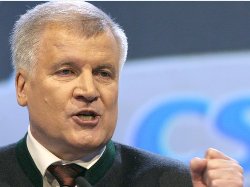Bavarian premier to seek dialogue with Czechs in expulsion dispute
 Augsburg, Germany - Bavarian Prime Minister Horst Seehofer said Sunday he planned to revive the dialogue with the Czech Republic over outstanding issues related to the expulsion of ethnic Germans from Czechoslovakia at the end of World War II.
Augsburg, Germany - Bavarian Prime Minister Horst Seehofer said Sunday he planned to revive the dialogue with the Czech Republic over outstanding issues related to the expulsion of ethnic Germans from Czechoslovakia at the end of World War II.
Seehofer told a rally of the Sudeten German Association, attended by several thousand mostly elderly expellees, that he intended to visit Prague next year.
He said he would be going "with an outstretched hand" and would seek advice from the Sudeten Germans in preparing the trip to Bavaria's neighbour.
A major dispute between the two sides centres on the decrees proclaimed by the late president Edvard Benes that led to the confiscation of German property and the deportation of more than 2 million Sudeten Germans, who were accused of being Nazi collaborators.
The collective expulsion remains unjust, Seehofer said, adding the controversial Benes Decrees should not be allowed to remain valid forever in a Europe based on freedom, justice and human dignity.
Many died in the brutal expulsions and hundreds of thousands later settled in Germany and Austria where they and their descendants still live, preserving their dialect and customs.
Another speaker at the rally, Sudeten German Association chairman Franz Pany, criticized Czech President Vaclav Klaus for his "anti-European attitude" and for upholding the Benes Decrees.
He urged the Czech government to enter into a direct dialogue with Sudeten Germans.
Nazi dictator Adolf Hitler forced Czechoslovakia to cede its western Sudetenland region to Germany in 1938 on the grounds that German speakers were being persecuted there.
Hitler seized the rest of the country in early 1939, ahead of his invasion of Poland in September, which precipitated World War II.
After the war, the seized territory was restored to Czechoslovakia, but the post-war expulsions under the Benes Decrees, which have never been repealed, remain a sore point for many Germans. (dpa)